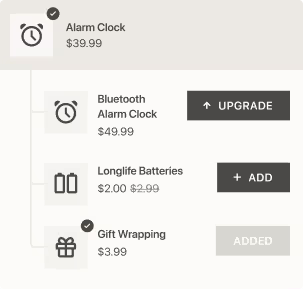Shopping apps have been a successful sales channel for online stores for years. In 2022, sales from mobile devices reached $431 billion in the US only, with apps being responsible for the majority of it.
Research from 2016 indicates that half of shopping apps have been used at least once a week. More recent studies show that e-commerce apps bring more conversions: according to Shopney’s data, 54% of users make a purchase via an app compared to 34% of mobile browser users:

With that said, in-app shopping is an already established pattern that you shouldn’t ignore.
However, a lot of small stores don’t have apps—it’s been discovered that 93% of big e-commerces (with 200+ million visitors) have it, while the smaller the store, the smaller the likelihood of having a branded app. Maybe, the resources needed for custom app development stop companies from designing their shopping apps. But there are many cost-effective or even totally free solutions—for instance, mobile app builders for Shopify and other platforms.
Before we explore the ways to create a mobile app for your Shopify store, let’s dive into the benefits of having one.
The benefits of having a mobile app for a Shopify store
- Convenience for users.
At the end of the day, online stores should always cater to the needs of users and provide them with what’s the most convenient and helpful to them. As a survey by Heady reveals, convenience tops the list of reasons why shoppers prefer mobile apps, along with promotions and user-friendliness:

- Increased loyalty.
By giving consumers a convenient way to shop, you’re increasing the chances of getting sales and boosting customer loyalty. The more satisfied users are with your app’s UX and features, the more likely they will stay loyal to your brand.
- More conversions.
Mobile apps allow for many effective marketing techniques, push notifications in particular. If you send a back-in-stock alert or a cart abandonment message as an app notification, it will be more likely seen than, for example, an email. Push notifications are the easiest way for e-commerce businesses to connect with their customers, as well as the shortest way for a customer to go from being informed about something to making an action in the app.
As statistics we’ve mentioned show, customers view more products, add more items to the cart, and complete more purchases in the app, compared to shopping in mobile and web browsers. With an app that is easy to navigate, you can significantly increase your conversion rates.
- Easy way to keep customers updated.
The app’s home screen and notifications give you room to present new arrivals and the latest promotions. You can also personalize them to show offers a particular customer might be interested in, based on their browsing and order history in the app.

How to convert a Shopify store to a mobile app
When you decide to create a mobile app for your store, you have several options:
- Custom mobile app development for Shopify.
This is the most time- and money-consuming way, but it’s worth it if you want above-the-average functionality and have specific ideas for your app’s design. To create a successful app for a Shopify store, you need to find a reliable development provider that has similar projects in their portfolio and discuss your requirements. After deciding on the scope of development, it’s best to be actively involved in the process to see how each feature is working.
- Third-party white-label solutions.
There’s an option to white-label the app, which means using a pre-defined template with some basic functionality and adjusting it to your store with branding and product information. There are many solutions like Shopify To App that help build an app with no coding. If you decide to go with this option, consider the following when choosing a solution: does it automatically sync data with your Shopify store, what can you customize, and what features are included.
- Shopify mobile app builders.
There are plenty of mobile app builders that can turn your Shopify store into an app. They differ in the number of features, supported integrations, customization limitations, and pricing plans. We’ve compiled a list of the best Shopify mobile app builders to help you find the most suitable one.
Major things to consider when creating an app for a Shopify store
Whatever method you choose, you should decide on certain aspects before making an app for Shopify:
- Set of features. This is the most important aspect of your app. Most ready-to-use solutions include the most-demanded features like push notifications. But when it comes to something like wishlists, delivery tracking, Instagram shopping feeds, or reward programs, mobile app builders might not offer that. Prepare a list of all must-have and nice-to-have features so that you definitely know what you need.

- Integrations. You might want to integrate your app with other services: Shopify apps with user reviews, email marketing tools, live chat, etc. Check if those integrations are possible in an app builder or discuss them with a developer.
- Payment methods. It’s also important to choose what payment methods your app should accept and if it’s possible to integrate them. Since consumers like it when they can complete a purchase as fast as possible, integrations with Google Pay and Apple Pay, as well as with popular gateways like PayPal, should be a must.
- Budget. Set a budget limit and a timeframe for your app to be ready. Surely, there’s no need to overspend on app development, anticipating the profits it might bring. You can start from a simpler solution and then scale it.
We hope this helps, and you’ll make a beautiful and conversion-driving app for your store.
















